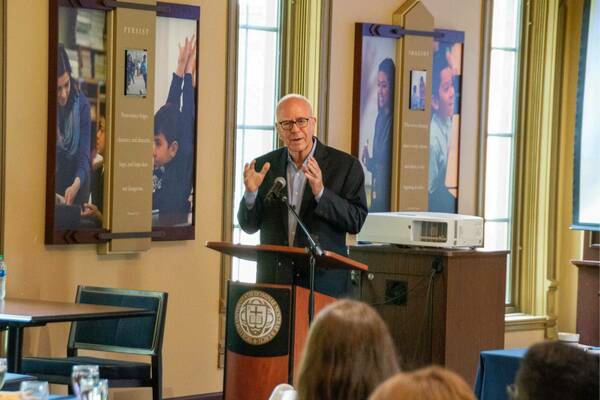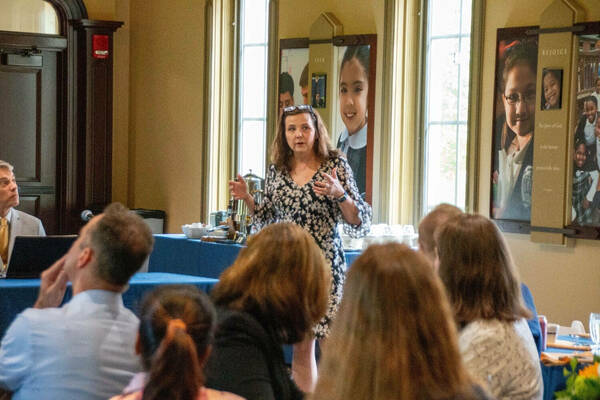
On May 6, the Notre Dame Law School Global Human Rights Clinic (led by Professor Diane Desierto) and Education Law Project (led by Professor Nicole Stelle Garnett) welcomed United Nations Special Rapporteur on the Right to Education, Pakistani sociologist Farida Shaheed, during her first official visit to the United States and her first visit to the University of Notre Dame. The University hosted a high-level private consultation with Shaheed, who is currently visiting the United States at the invitation of President Joe Biden. At the conclusion of her visit, she will make a report to the United Nations Human Rights Council on the education systems within the United States.
In the morning, Shaheed visited John Adams High School in South Bend, Indiana, and then proceeded to Notre Dame to attend two panel discussions and engage in questions and dialogue with multidisciplinary experts on education. The panelists discussed the human right to education, parental choice, and the many contributions of faith-based education in helping to realize wider access to primary and secondary education for diverse, underserved, and vulnerable communities.
The first consultation panel focused on the human right to education under the International Covenant on Economic, Social and Cultural Rights and related international jurisprudence, the protection and definition of the same right under the U.S. legal system, Global South case studies on culturally appropriate and grassroots-driven innovative education partnerships by the Notre Dame Global Center for the Development of the Whole Child, and education innovations and homeschooling in the United States in the aftermath of the COVID-19 pandemic.
The panelists included Neil Boothby (Global Center for the Development of the Whole Child), Professor Diane Desierto (Notre Dame Law School), Professor Jorge Barrera-Rojas (Notre Dame Law School) and Michael Donnelly (yes. every kid. foundation.).

Boothby, the director of the University of Notre Dame’s Global Center for the Development of the Whole Child, spoke about the Center’s approach to whole child development, utilizing systems strengthening through its intervention science efforts, and embedding a learning-through-doing approach.
“Regardless of what kind of system you're talking about, the household is a key part of the learning system. 80 percent of the human intellectual capacity is created in the first thousand days of life,” said Boothby. “Parents are the first teachers, and if we can't change the economic status of the families, which we should strive to do, it may be the numbers of words that children are exposed to before they start school that we can change. If parents have that knowledge, that's something that they can achieve. The conversation globally is just beginning to happen — to take this science into account. But it needs to be accelerated if we're going to achieve equity for all.”
The second consultation panel focused on the role of faith-based schools in advancing access to high-quality education for disadvantaged minorities and underserved populations and inner cities, parental choice and educational freedom under the history of education law and more state-driven institutional models in the United States, and the many contributions of, and challenges faced by, faith-based schools in the United States to initiating and expanding access to quality education in the Global South.
The panelists included Professor Nicole Stelle Garnett (Notre Dame Law School), John Schoenig (Alliance for Catholic Education), and two school leaders, Antonio Ortiz, the first lay president of Cristo Rey Jesuit High School in Chicago, and Christian Dallavis, the assistant superintendent of the Partnership Schools, which operate Catholic schools serving low-income students in Cleveland, the Bronx, and Harlem. Both Ortiz and Dallavis are Notre Dame graduates and served following graduation in Notre Dame’s Alliance for Catholic Education.

"Faith-based schools have historically been financially accessible to the poor,” said Garnett. “Throughout our nation’s history, faith-based schools have provided affordable, high-quality educations that have lifted generations of children out of poverty and prepared them for successful, productive, and fulfilling lives.”
Following the panel discussions, attendees had the opportunity to ask questions and share their insights. Shaheed said, “I have a problem with linking education only to the job market. Education has to be rounded. It has to be based on human rights, and it needs to explore and enable everyone to reach their full potential.” Dallavis responded that every child in Partnership Schools, and Catholic schools from around the nation, is reminded that they are loved and made for greatness.
In addition, the University of Notre Dame's President-Elect Father Robert Dowd delivered remarks, in which he spoke about his work on education initiatives in Africa and Latin America through his years of leadership as the founder of Notre Dame’s Ford Program in Human Development Studies and Solidarity. In keeping with Catholic Social Teaching, the Program is committed to forging community-engaged research partnerships in the Global South.
Notre Dame Law School is grateful for the support, attendance, and participation of colleagues from across campus, including Professor TJ D'Agostino (Kellogg Institute For International Studies), Professor Christine Trinter (Acting Director, Institute for Educational Initiatives), Professor Roger Alford (Notre Dame Law School), Professor Francisco J. Urbina (Notre Dame Law School), and John Meiser (Notre Dame Law School’s Religious Liberty Clinic), as well as the Notre Dame Law School Global Human Rights Clinic and Education Law Project students.
Originally published by at law.nd.edu on May 09, 2024.